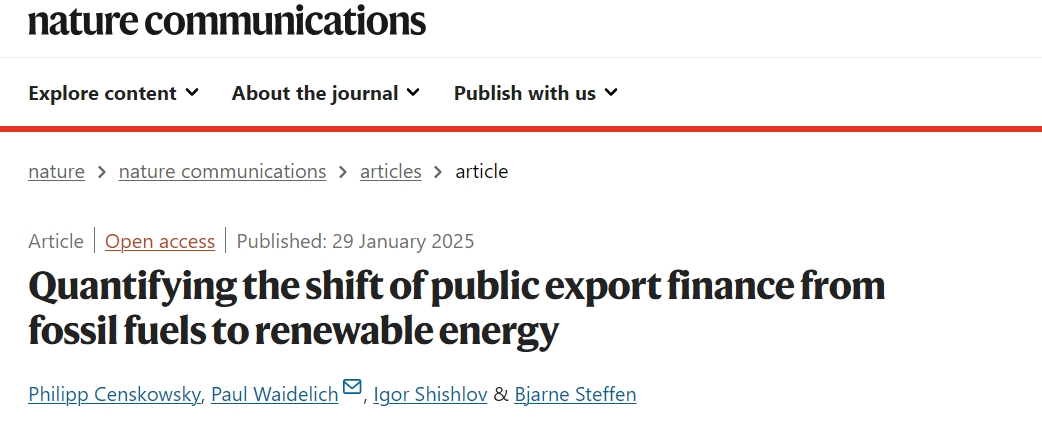New study: European Export Finance Drives Renewable Energy Transition, But Leaves Developing Countries Behind

- 29/01/2025
A new open-access study published in Nature Communications sheds light on how Export Credit Agencies (ECAs) are shaping the global energy transition. While the findings reveal encouraging growth in renewable energy financing, they also highlight ongoing support for fossil fuels and the unequal distribution of funding across countries.
This study, the result of a multi-year research collaboration between HEC Lausanne, ETH Zurich, HEC Paris, and Perspectives researchers Igor Shishlov and Philipp Censkowsky, provides the first comprehensive assessment of ECA-supported energy transactions on a near-global scale. The authors analysed nearly 1,000 energy infrastructure deals between 2013 and 2023, examining the role of ECAs in financing the energy transition through loans and credit guarantees.
Key Findings
1. Renewables are on the rise—but fossil fuel support persists
The study finds that the share of ECA commitments to renewable energy has risen significantly over the past decade—from under 10% in 2013 to around 40% in 2022–2023. This trend is largely driven by offshore wind, and more recently, green hydrogen projects. Yet, despite this surge in renewables, fossil fuels, especially oil and gas, continue to draw substantial ECA support.
2. National disparities with consequences for policy
The study revealed that ECAs do not all follow the same trajectory, highlighting notable disparities between countries. For instance, members of the Export Finance for Future coalition (E3F), a group of European countries committed to aligning their export finance with the Paris Agreement, have introduced stricter fossil fuel exclusions and are boosting their renewable portfolios.
3. Wealthier nations receive a disproportionate share
Finally, the study revealed a concerning trend, that is, the ‘greening’ of ECA portfolios, which is to the detriment of support to developing countries. In fact, the share of ECA energy finance going to lower-income countries dropped from 47% in 2013-15 to below 30% in 2022-23.
Looking ahead: policy recommendations and next steps
The study’s authors emphasize that their findings likely underestimate fossil fuel support, as data availability remains limited, particularly for key ECA countries such as Canada and China. Their findings call for more rigorous climate policies within OECD countries as well as for renewed international cooperation, especially with non-OECD countries such as China. Crucially, enhanced renewables support via ECAs could help scale up the new collective quantified goal (NCQG) on climate finance, set at a minimum of USD 300 billion annually by 2035 at COP29. Finally, ECA mandates should be broadened to accommodate the needs of lower-income regions – a prerequisite for a just and equitable energy transition worldwide.
For more information, read the official press release.
Kudos to the co-authors from ETH Zurich, Paul Waidelich and Bjarne Steffen, for their contributions to this important research.

